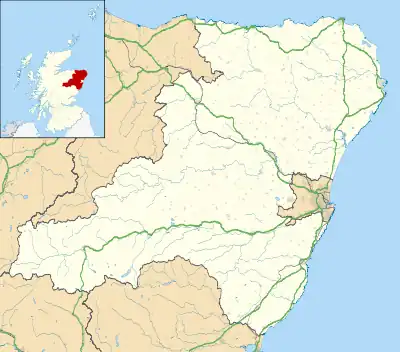| Battle of Lumphanan | |||||
|---|---|---|---|---|---|
| |||||
| Belligerents | |||||
| Scottish Crown | Rebels | ||||
| Commanders and leaders | |||||
| King MacBeth † | Malcolm Canmore | ||||
 Location within Aberdeenshire | |||||
The Battle of Lumphanan was fought on 15 August 1057, between Macbeth, King of Scots, and the future King Malcolm III. Macbeth would die from wounds sustained in the battle, which came after his defeat at the battle of Dunsinane in 1054. According to tradition, the battle took place at Lumphanan in Aberdeenshire. Macbeth's Stone, a large boulder at the site, is said to mark the spot where Macbeth was mortally wounded. Following the battle Lulach, Macbeth's stepson was crowned King, before being killed by Malcolm who then took the throne.
Background
Since the death of his father, King Duncan, in battle with Macbeth, Malcolm had been sheltered by Earl Siward of Northumbria,[1] his uncle.[2] It was with Siward's backing that Malcolm first attacked Macbeth leading to the battle of Dunsinane in 1054, where Malcolm failed to win the crown, but had his own lands restored to him.[1] Some sources say it was Edward the Confessor, King of England, who ordered Siward to launch this invasion of Scotland.[2]
The battle
After retreating North, Macbeth would again face Malcolm in battle at Lumphanan,[3] in modern day Aberdeenshire.[4] The battle itself appears to have been a comparatively minor affair, except for Macbeth being mortally wounded and later dying.[3] Sources describe the battle as taking place "in a wood".[4]
Macbeth's Stone, a large boulder at the site, is traditionally held to mark the location where Macbeth was wounded.[4]
Aftermath
Following the death of Macbeth, his stepson Lulach was initially crowned king. 18 weeks later, in 1058 Malcolm killed him by 'treachery' at Essie, near Aberdeen.[1] Upon assuming the throne, Malcolm, with the help of his English queen, Margaret, began the long task of removing Gaelic culture from mainstream Scotland.[3]
References
- 1 2 3 Broun, Dauvit (2015). "Malcolm III". In Cannon, John; Crowcroft, Robert (eds.). The Oxford Companion to British History (2nd ed.). Oxford University Press. Retrieved 6 August 2020.
- 1 2 Aird, William M (2004). "Siward, earl of Northumbria". Oxford Dictionary of National Biography (online ed.). Oxford University Press. doi:10.1093/ref:odnb/25652. (Subscription or UK public library membership required.)
- 1 2 3 Archibald, Malcolm (2016). Dance If Ye Can: A Dictionary of Scottish Battles. Creativia. ISBN 1536821799.
- 1 2 3 Historic Environment Scotland. "Macbeth's Stone (17501)". Canmore. Retrieved 14 August 2022.